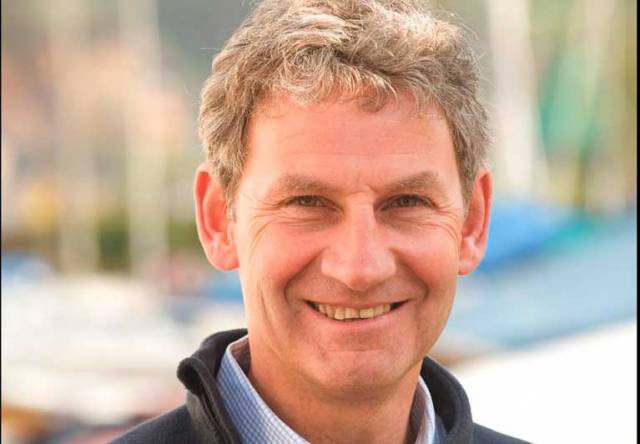John Derbyshire OBE, whose involvement with the RYA’s Racing programmes spans some 32 years as a coach, Olympic Manager and as latterly Director of Racing, is to retire from the organisation in late 2017.
Two exciting opportunities will now exist for two exceptional people to help shape the future of sail racing in the UK and the medal fortunes of the world’s leading Olympic sailing nation.
With Olympic Manager Stephen Park OBE also moving on this spring, the RYA is seeking two outstanding candidates to lead the development of racing in the UK, the World Class Programme and the British Sailing Team for the Tokyo 2020 cycle and beyond.
Derbyshire first joined the RYA as National Racing Coach in 1985 – coaching Finns, Europes and Lasers until 1996, whereupon he became Olympic Manager for the Sydney 2000 cycle. Sydney was the first Games following the introduction of National Lottery funding for sport and one which saw Britain’s biggest performance improvement at any sailing Games.
Derbyshire was also personal coach to Sir Ben Ainslie from 1994-2000, including at Sydney where Ainslie won the first of his four Olympic gold medals, and coached other notable sailors such as Shirley Robertson, Iain Percy, Andrew Simpson and Hugh Styles during his career.
Since 2001 he has been the Director of Racing, overseeing the RYA’s World Class Programme and talent pathways, as well as the broader remit of racing participation in all its forms in the UK.
Following a staffing review, the RYA will look to recruit its new Director of Racing as a first priority to enable a suitable handover period, and to allow the successful candidate to be involved with the recruitment of an Olympic Manager to succeed Park.
“It had always been my intention to retire in the early part of this cycle, and with a new Olympic Manager to recruit as well it makes logical sense for my successor to be involved in that process to ensure the best possible handover,” explained Derbyshire, who will remain full time in post until 1 September 2017.
“I feel hugely proud of what has been achieved during my time with the RYA. The sport has evolved enormously during that period and it’s been a privilege to have led a programme which has helped develop the talents of countless sailors at many levels and in so many facets of the sport, and which has been so dominant on the world stage for so many years.
“I’ve been incredibly fortunate to have been aided in that task by an immensely committed group of athletes, coaches, support staff, officials and volunteers who are so passionate about the health and continued success of the sport in this country.
“The RYA’s World Class Programme is in great shape, with a wealth of talented sailors, coaches and support staff and a favourable funding award from UK Sport to underpin our performance strategy for Tokyo 2020 and beyond.”
UK Sport Director of Performance Chelsea Warr said: “John’s contribution to the success of the RYA’s World Class Programme over a long period of time has been enormous.
“He will be greatly missed by all of us working across the UK high performance system but he will leave a great legacy that will see the sport build on the strong foundations he has laid.
“I am delighted that John will remain in post until September to ensure the best possible handover that will support the new individuals coming in as they look to ensure further success in the Tokyo cycle.”
RYA CEO Sarah Treseder added: “John’s contribution both to British sailors’ medal fortunes and to the standard of UK racing both domestically and internationally cannot be understated, and his experience and insight will be greatly missed.
“I am delighted that we will continue to have the benefit of his experience during this transition period, and would like to place on record our thanks to John from the RYA and the wider sailing community for so many years of dedicated service to the sport.
“Both John and Sparky together have driven forward challenging programmes capable of delivering over successive years and cycles.
“Exciting opportunities now exist for two new individuals to take up their batons, further develop and refresh our Racing programmes and ensure this success continues in the years to come.”
Role descriptions and application details for both the Director of Racing and Olympic Performance Manager roles are available on the RYA website.
Requests for initial confidential conversations in connection with these posts should be sent to Dawn Brown: [email protected]






























































